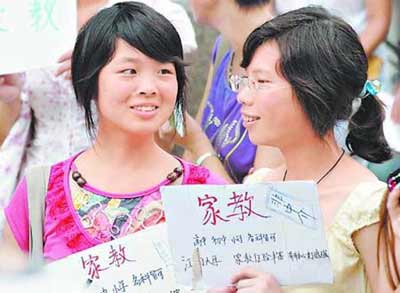| Home / Education / News | Tools: Save | Print | E-mail | Most Read |
| Students Highlight Importance of Family |
| Adjust font size: |
In late-January the campus of China Petroleum University (CPU) was already beginning to look grey. The leaves on the trees had disappeared and so had most of the students. They were heading home for Spring Festival which is
But Tang Jiaguo had chosen to stay behind and with good reason? The hard-up 20-year-old business management sophomore was waiting for part-time job offers hoping to earn money to offset the cost of his education. Going home to spend time with his parents and two sisters was something he simply couldn't afford. Tang's home is deep inside the Xinjiang Uygur Autonomous Region. To save on costs he's to take slow trains, sitting on a hard seat for three days and nights if everything goes according to plan. "I'm OK with the travel it's just that if I go home I'll lose the opportunity to earn some money," Tang said, as he walked out of the library wearing a dark-green overcoat which was gifted to him. Tang believes in an old Chinese proverb which says that if a couple is poor almost everything in their household is sad. "I can go home but there are so many worries," Tang said. "The family is deep in debt to pay for my sisters' education and I have my own living expenses in the next semester to worry about," he explained. The China Foundation of Poverty Alleviation say there are around 7,000 poor students in The foundation recently polled 2,790 poor students who chose to stay in "Most of my classmates can be with their families and talk to their friends at home but I'm stuck alone in
But the robust 22-year-old Muslim student said he had to stay to work. His family in Ningxia, his parents and three younger sisters, rely on 0.46 hectares of cornfield for their income. It yields annually less than 3,000 yuan (US$380). Hei's tuition fees are around 5,000 yuan (US$640) a year excluding the cost of food and boarding. Though he's taken loans to cover the majority of his costs Hei says he has to earn enough money to ensure he's not asking the family for further financial support over the next three years. The survey also found that 35 percent of the polled students couldn't afford a ticket home. And around 70 percent said they'd seek part-time jobs. A month before the Lunar New Year, which falls on February 18 this year, railway tickets were already hard to get as millions of college students and migrant workers prepared to head for home. Airline companies have started canceling discounts. While poor students long for a family reunion for many urban kids the holiday is just another time to be spoiled. According to tradition kids are supposed to be dressed head to toe in new clothes, eat fine meals and receive "red envelopes" (hongbao) containing money from the elderly. It's not uncommon for kids from well-to-do families to receive thousands of yuan. In the survey most of the respondents said their monthly expenses were 200-300 yuan (US$26-38). But Tang said at his university there were many rich students whose monthly expenses reach thousands of yuan even though the school was located on the outskirts of "It's really sad to learn that classmates around you are too poor to go home at an important time like Spring Festival," he said. Such cases were not rare in his undergraduate class. "The fact that they can't live like most people around them is a big problem in schools. The concept of equality is on shaky ground," he suggested. Even though many poor college students miss out on family gatherings, suffer disappointment and encounter dishonesty in their part-time jobs they're seen as their family's best chance to escape the poverty trap, say education experts. Hei was the first person to enter a university from his home village in Ningxia. He said most of his high school classmates, who failed the college entrance exam, were preparing to sit it again this year. The reason was simple Hei said. "Before entering university I once worked at a construction site in the Inner Mongolia Autonomous Region earning less than 40 yuan (US$5) a day for 12 hours of outdoor toil but now as a part-time tutor I earn 30 yuan (US$4) per hour teaching middle school maths. I want my parents to live an easier and better life," he said. "Life has toughened me up and I believe I can make a difference," said Tang, who wants to return to Xinjiang after graduation and find a job in an oil company. "There's nothing wrong with being born poor but wanting to stay poor is stupid especially for young people." ( |
| Tools: Save | Print | E-mail | Most Read |
 |
| Related Stories |
|
